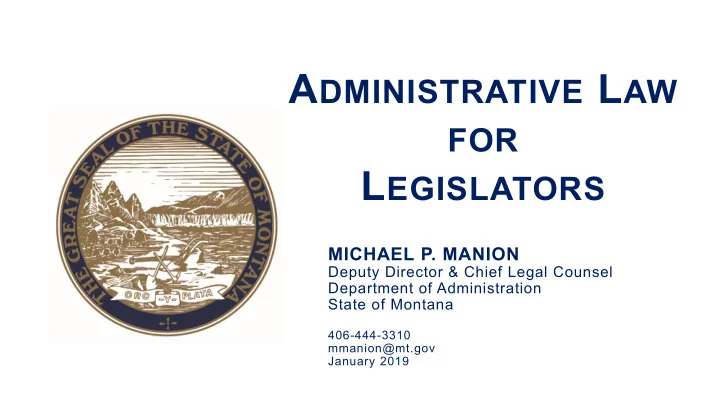

A DMINISTRATIVE L AW FOR L EGISLATORS MICHAEL P. MANION Deputy Director & Chief Legal Counsel Department of Administration State of Montana 406-444-3310 mmanion@mt.gov January 2019
What is Administrative Law? • Administrative Law is the body of law that governs federal and state agencies. • In a positive sense, it is the law that breathes life into the Legislature’s intent expressed in statute. • In another sense, it is the limits placed on the powers and actions of administrative agencies. 2 STATE OF MONTANA
Agencies’ Powers • Typically, agencies in the federal and state governments are granted powers that are characteristic of each of the branches of government. • Some agencies have authority to issue rules that control behavior and assess penalties for violation of these rules; • Some have authority to investigate potential violations of rules; and • Some have authority to adjudicate disputes between or among parties. 3 STATE OF MONTANA
Why have these Delegations of Power Occurred? • Expertise and knowledge in the agencies • Flexibility to address change • Consistency and predictability 4 STATE OF MONTANA
Finding the Sweet Spot The “Sweet Spot” The challenge is to find the “Sweet Spot” between utilizing these agency Executive advantages and honoring the constitutional distribution of power – called Separation of Powers – among the legislative, executive, and Legislative Judicial judicial branches. 5 STATE OF MONTANA
Montana Administrative Procedure Act (MAPA) • One of the ways to achieve this workable balance is to adopt an “Administrative Procedure Act,” which outlines defined duties and responsibilities for agencies. • The federal government has adopted the Administrative Procedure Act and Montana has adopted the Montana Administrative Procedure Act . • (Title 2, Chapter 4, MCA) 6 STATE OF MONTANA
Montana Administrative Procedure Act (MAPA) • The express purposes of MAPA are: • Give notice to the public of government action and to provide for public participation in that action; • Establish due process safeguards in rulemaking, legislative review of rules, and contested cases; • Provide standards for judicial review of rules; and • Give statutory directives to executive and judicial branches. 7 STATE OF MONTANA
Legislature’s Role in Rulemaking • In a statute, the Legislature authorizes an agency to make rules. • Typically, the rule instruction in the statute is something like this: • “The Department shall adopt rules necessary to carry out the intent and purposes of this chapter.” or • “In particular, the Board shall adopt rules concerning the authorization of new banks under the laws of the state. Rules must contain minimum standards under which an application for a new bank must be determined, including the following…” 8 STATE OF MONTANA
Legislature’s Role in Rulemaking • Once the agency drafts the rule, a lawyer for Legislative Services will review the rule and report on the rule to the committee that oversees that agency. • If a rule(s) implements legislation, the agency must obtain the legislator’s comments when beginning work on the substantive content and wording of the rule(s). 9 STATE OF MONTANA
What Have Courts Said about Delegation of Rulemaking Authority? • The Legislature must provide sufficient statutory standards and criteria to guide the agency. In re Gate City Savings and Loan Association (1979). • Generally, agencies appreciate clear, succinct guidance because there is less room to misinterpret the Legislature’s intent. • On the flip side, the Legislature may not interfere with the Executive Branch in carrying out the law. • e.g., making specific staffing or resource allocation decisions 10 STATE OF MONTANA
Recommend
More recommend